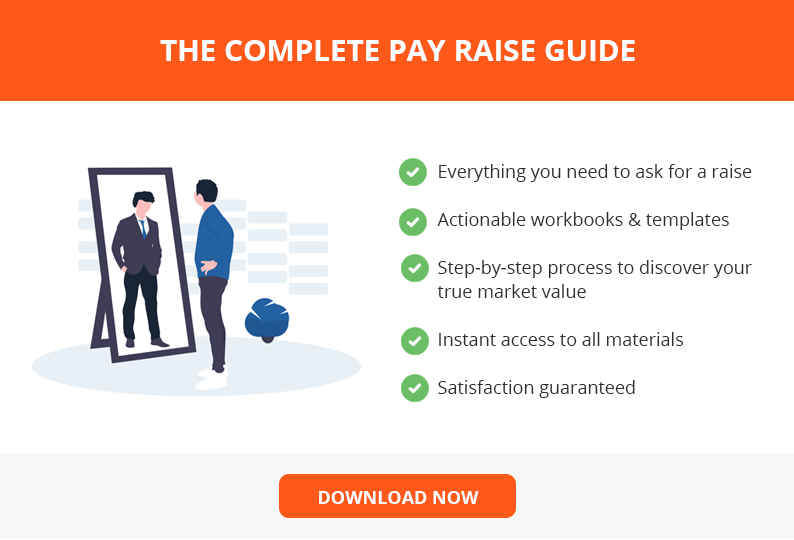How to ask for a raise when taking more responsibility
- Step 1: Understand and be able to articulate the workload increase
- Step 2: Put together your argument and talk track for asking for a raise
- Step 3: Be prepared for a “No” and have alternative requests ready
- Step 4: End the conversation on a positive note
Before asking for a raise because you’re taking on new challenges and greater responsibility, you must first understand the duration of that responsibility. From there, you’ll have to research the market rate for the work you’re doing and understand the intricacies of how to ask for a raise when taking more responsibility at work, to prevent being turned down. Or worst, possibly let go by your employer!
Let’s go over several factors that come into play when you’re trying to figure out the right time to ask for a raise. This will include variables like how much of a raise to ask for, now to discuss your new/increased workload, and how to properly leverage the discussion, to ensure you get what you’re requesting.
Step One: Understanding the Workload Increase
Probably the most important thing for you to understand when taking on increased levels of work, or an increased workload with your employer, is why? Some reasons you’re asked to work longer hours might include
Training a temp-employee or a new hire that will work in your department
You’re working on a special project (that you chose/weren’t asked to take)
You’re being promoted to a new role because the company is downsizing
Someone’s out sick for the week and the company asked if you wouldn’t mind helping
As you can see, not every one of these scenarios is the same. Therefore, understanding when you’re being asked to do more, why you’re being asked to do more, and for what duration, are some variables that will help you determine if a raise is appropriate or not.
Your Title Changes: Ask for a Raise
If you’re being promoted with a new title (going from GM to CFO), you’d expect an increased workload. Especially if it’s a global company or a huge company in your local community. In this case, most employers would automatically discuss a pay raise with you when promoting you. However, if they don’t, and you believe you deserve a raise, you’ll have to discuss it. If you work for a small business or family business, it may not be so formal.
In this situation, you should receive a raise. You’re probably
- Putting more work in at the office and coming in earlier/leaving later
- Managing more employees and overseeing departmental work
- Focused on budgeting and tasks that will implicate the company’s bottom line
- Have a new degree or certification
Since your decisions are important to the company’s success, your salary should increase. In this situation, a raise is expected (and most reasonable people would agree). Don’t hesitate to schedule a meeting with your boss to talk about it!
An Employee was let go (Company Downsizing): Ask for a Raise
If an employee was let go within your department, and the company isn’t willing to hire someone to replace them, you’re going to be left with more work to do. And, the amount of work will depend on how many employees are left in the department. If it was just you and the employee that was terminated, you’re likely taking on double the workload. Again, this is a situation in which most reasonable employees would expect a raise. And, most reasonable employers, would bring you into their office to offer a raise.
Knowing how to ask for a raise based on increased workload is the perfect option for this situation.
It’s Temporary: Don’t Ask for a Raise
Let’s say an employee is on maternity leave and you’re asked to work a few extra hours per week for two weeks. Or, if an employee is out sick and your boss asks you to come in one-hour early for a couple of days before the can hire a temp-employee to cover that employee’s schedule while they recover, is it time for a raise? Even if this means you’re working an additional 10 hours per week? Most employees wouldn’t ask for a raise, and it might hurt your standing with your employer if you asked for one.
In this situation, most employees would be reasonable enough to understand it’s short-term, this isn’t going to happen forever. Now, if your employer takes advantage of your good-natured attitude, and extends a few days into a few months, it’s time to step up and say something. There’s a difference between helping out for a short period, being taken advantage of, and understanding the situation. Everyone’s worked a few extra hours without wanting to. It’s not a viable reason to ask for a $1K raise.
You’re Working on a Special Project: Don’t Ask for a Raise
And, we’ll cover one more example of understanding when the time’s appropriate for asking for a raise. Let’s say your boss presented you with a special project two months ago. They said it was optional and it wouldn’t affect you if you said you couldn’t handle it. You gladly jumped on board and took the project. However, it’s required you to work an additional 50 hours over the three months you’ve been working on it. You’re exhausted, and you’re putting more time in at the office than you are at home.
This is a tough situation. Most reasonable employees wouldn’t expect a raise. Your boss didn’t force you to take it and informed you it wouldn’t affect your standing with the company if you couldn’t handle it. You took it because you wanted to. In most cases, you might want to complete the special project and move on. Or, talk to your boss about having someone help you complete it if you’re overworked. But, this isn’t a situation where you’re entitled to a raise because you took on the work; you chose to, and it wasn’t something your employer required you to do.
As you can see, the first two examples are situations where most people would expect and should receive a raise. The latter isn’t as clear cut (at least not the final example). Before you go barging into your boss’s office demand for a raise, make sure you know how to ask for a raise when taking more responsibility at work (and whether that responsibility is forced upon you/expected or is optional).

Step Two: Approaching the Talk (How to Bring it Up)
If you’re in the camp that deserves a raise, you now have to know how to bring it up. You have to be respectful, assertive, and prepared, if you want your boss to listen. So, let’s go over a few tips to help you prepare for the talk, and ensure you receive what you’re entitled to.
Come in Prepared to Negotiate
In some cases, you go in prepared with a long speech and stats, but your boss immediately agrees to the raise. This won’t often happen, but if it does, thank them and accept it. Conversely, most employers will take a meeting with you, but you’ll have to be prepared.
When you’re ready to discuss the raise, make sure:
- You are prepared
- You’re confident in your approach and reasons you deserve the raise
- You’ve practiced your sales pitch and have clear speaking points
- You can present concrete evidence (figures that prove your worth) of how you’ve helped the company
- You’re willing to negotiate!
Sometimes you do everything right, and you’re still told no. allow your employer to make a counter-offer and make sure you’re willing to listen to their arguments. Talk, don’t automatically walk away. Have a discussion, be respectful, but don’t get taken advantage of. If your employer truly values you and the work you do, they’ll at least meet you halfway!
Also see:
- When should I ask for a raise?
- How to ask for a raise in a small business?
- How to ask for a bigger raise than offered?
Develop Counter-Arguments (Respectfully)
Have a list of counter-attacks prepared. These might come in the form of
- Bullet points about how you’ve improved the department’s operations
- Lists of ways you’ve helped manage employees and improve efficiency
- Figures about increased profit margins and revenue
Again, keep it respectful. Have a discussion, not a shouting match. And, don’t set a ceiling for yourself with the raise request. Your boss might meet you half or a ⅔ of the way there. If you put a ceiling on your growth, you’re stuck with that. Have clear cut responses to their answers and make sure you can back everything up when you’re countering their “nos.”
Have Statistics in Place (and Don’t Automatically Say no if Other Options are Offered)
This is the best defense against an employer telling you that you’re not getting a raise. When the stats speak volumes about what you’ve done for the company, it’s hard for them to let you go. It’s harder for them to dismiss your request, and they’ll at least have to consider offering you some kind of bonus to keep you happy.
When you have proven ways in which you make the company better, you’re going to find it easier to ask for a raise and receive it. On this same note, don’t automatically say no if your employer makes a counteroffer.
For example:
- Stock options
- An increase in your temporary base salary
- A guaranteed annual bonus
- Options to buy into the company, and other offers, should be evaluated
Money’s great, but these options might be just as good, if not better, in the long run.
Understand the Market Rate for the Title (and Your Region)
Let’s say the average salary for a marketing manager is $140K. However, this is for managers with 10+ years of experience, and the range for that job is between $80K to $150K. Now, let’s assume you’re promoted to this job. However, your previous salary was $75K, and your company offered you a salary of $100K.
You might be thinking to yourself “That’s $40K less than the average.” But, do you have a case? Especially if you’re living in a remote area or a region of the country where the average salary for this role is $90K?
Make sure you understand the market, the job title, where you live, and your experience level. This will help you better determine if you’re in a position to ask for a raise, should ask for one, and how much you should expect if your employer does offer you a raise.

Step Three: Be Prepared for No!
You might do everything right. You have your stats in place, you’ve proven your worth, you’ve been a dedicated employee for over 10 years, and your company doesn’t agree to the raise you’re requesting. What should you do? Raise Guide has an article on what to do when you are told no. These are a few more factors you’ll consider when determining how to ask for a raise when you are underpaid.
Discussing a Possible Time Frame for a Raise
If your employer wants you to stay and tells you they can’t offer a raise now, but can offer a raise shortly, make sure you know when they’ll make that offer.
Make sure to:
- Get it in writing with dates/offers and terms
- Put a time frame in place, and ask if they can agree to your terms
- Discuss your options and other possible ways they can compensate you if they don’t offer a raise immediately
Ask the right questions and make sure everything’s in writing. If it’s a he-said-she-said situation, you’re going to keep working towards something you’ll never receive, and you have no proof that the conversation happened.
Knowing When to Walk Away/What You’re Worth
Value yourself enough to know when it’s time to walk away. If your employer wants you to do the work that two employees were doing, and isn’t willing to offer anything, or offers a raise that’s insulting, know that you are worth more. And, with your experience, and the concrete stats you have to show how you’ve helped the company grow, you’ll find something quickly, with an employer that’s going to pay you a salary that’s commensurate with the work you’re doing.
Having an Alternative Lined Up
If you can’t agree on terms and have tried all the negotiating tactics, having a job offer lined up is your best bet to getting that raise. Make sure you’re not solely relying on this approach, but it’s a good way to have your company make a counteroffer to see if it’s worth staying. If your employer knows your value (they do if they’re giving you more work to do), they’ll at least discuss a higher salary with you. Use this to your advantage, but don’t do so in a way that will cause animosity or disdain, especially if the other offer falls through, or you can’t agree to terms on a raise.
End it Positively!
Even if you can’t agree to the terms right away, leave room for future discussions. And, if you choose to leave, make sure you end it on a positive note. Thank the employer for the opportunity and your time with the company. You never know when you might need a reference, so you don’t want to burn bridges when you leave. And, if you decide to stay but haven’t agreed to a raise/terms just yet, leave them with the idea that it’s a win-win for them to offer you a raise. Let them know when they won’t find a better option out there, and how much you’re going to do for the company moving forward in your new role.
It’s not easy asking for a raise. And, if done incorrectly, you run the risk of alienating yourself from your employer or possibly losing your job if you’re disrespectful in the process. We hope this guide helps you learn how to ask for a raise when taking more responsibility at work and agreeing to terms with your employer for a higher salary.








